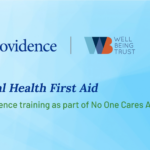Washington D.C., and Oakland, Calif., June 14, 2018 – In response to new data showing nearly 1 in 3 high school students report persistent feelings of sadness or hopelessness, Benjamin F. Miller, Psy.D., Chief Strategy Officer, Well Being Trust and John Auerbach President and CEO, Trust for America’s Health, issued the following statement.
It is tragic to see the latest indication that deaths of despair are increasing at a rapid rate, but, sadly, it’s not surprising. The drumbeat of data over the past six months supports our recent research suggesting, over the next decade, there could be 2 million deaths from drug and alcohol misuse and suicide.
This latest report must lead to action. With tragic news seemingly occurring weekly, these data threaten to desensitize us to this crisis. We know how to stop this. In our Pain in the Nation report, we called for the creation of a National Resilience Strategy that takes a comprehensive approach by focusing on prevention, early identification of issues and effective treatment, and we highlighted more than 60 policies, program and initiatives that can get us there.
Specifically, to prevent suicides, we must better integrate mental health into primary care, increase access to appropriate and affordable treatment, reduce the conditions that lead people to consider suicide and expand, knit together, and increase funding for:
- Crisis intervention services;
- Anti-bullying and social-emotional learning in schools;
- Support systems for veterans;
- Campaigns that normalize mental health conversations;
- Programs that teach effective coping, problem solving and parenting skills; and
- Suicide risk training for health professionals.
One example that combines a lot of these elements is the Zero Suicide Model, which utilizes a comprehensive approach involving screening, provision of services and a reduction of risk factors. It requires primary care doctors to screen every patient during every visit with two questions: How often have you felt down in the past two weeks? And how often have you felt little pleasure in doing things?
High scores lead to further questions about sleep disturbances, changes in appetite and/or thoughts of hurting oneself. Providers must indicate on each patient’s medical record that they completed the screening and, when they recognize a mental health problem, assign patients to appropriate care, which could include cognitive behavioral therapy, medication, group counseling or new care models such as same-day psychiatric evaluations, drop-in group therapy visits, and hospitalization, if necessary. Hospital staff are also trained to ensure patients who need follow-up care do not leave without an appointment and to conduct follow-up telephone calls. Additionally, providers partner with patients and families to limit access to guns and other lethal means of suicide.
The model, originally adopted by the Henry Ford Health System’s Behavioral Health Services division in 2001, led to an 80 percent reduction in suicide among Henry Ford HMO members and this reduction continues today even as the overall suicide rate in Michigan and across the country increases.
As a nation, we must do better and we must be better for our neighbors and family. Enough is enough, it’s time to increase investments in programs that prevent suicide and demand our elected officials – across all levels of government create and fund policies that will ensure everyone can realize their fullest potential.
Media Contacts:
Amy Shields
Director of Communications
amy@wellbeingtrust.org or 214-208-7942
###
Trust for America’s Health is a non-profit, non-partisan organization that promotes optimal health for every person and community and makes the prevention of illness and injury a national priority. For more information, visit www.healthyamericans.org. Twitter: @HealthyAmerica1
Well Being Trust is a national foundation dedicated to advancing the mental, social, and spiritual health of the nation. Created to include participation from organizations across sectors and perspectives, Well Being Trust is committed to innovating and addressing the most critical mental health challenges facing America, and to transforming individual and community wellness. www.wellbeingtrust.org. Twitter: @WellBeingTrust





